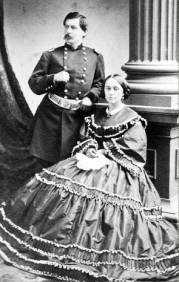American Civil War Letter
In 1861, a Union officer named Sullivan Ballou, assigned to the Grand Army of The Potomac, wrote home to his wife in Smithfield, Rhode Island.

July 14, 1861
Dear Sarah,
The indications are very strong that we shall move in a few days, perhaps tomorrow, and lest I should not be able to write you again, I feel compelled to write a few lines that may fall upon your eyes when I am no more.
I have no misgivings about or lack of confidence in the cause in which I am engaged. My courage neither halts nor falters. I know now how American civilization leans upon the triumph of our government, and how great a debt we owe to those who went before us through the blood and suffering of the Revolution. I am willing, completely willing, to lay down all my joys in this life to help maintain this government and to pay that debt.
Sarah, my love for you is deathless and seems to bind me with mighty cables that nothing but omnipotence can break. Yet, my love of country comes over me like a strong wind and bears me irresistibly with all those chains to the battlefield. The memory of all the blissful moments I have enjoyed with you come crowding over me, and I feel most deeply grateful to God and you that I have enjoyed them for so long.
Oh, Sarah, how hard it is for me to give them up and burn to ashes the hopes of future years, when, God willing, we may still have lived and loved together and seen our boys grown to honorable manhood around us. Sarah, if I do not return, never forget how much I loved you. Nor that when my last breath escapes me on the battlefield, it will whisper your name. Forgive my many faults and the many pains I have caused you. How thoughtless, how foolish I have sometimes been.
But Sarah, my dear, dear Sarah, if the dead can come back to this earth and flit unseen around those they love, I shall always be with you in the brightest day and darkest night. Always. Always. And when the soft breeze fans your cheek, it shall be my breath; or the cool air upon your throbbing temple, it shall be my spirit passing by.
Sarah, do not mourn me dead. Think only that I am gone and wait for me. For we shall meet again. My dearest Sarah, we shall meet again.
Captain Sullivan Ballou
Killed a week later at the First Battle of Bull Run

